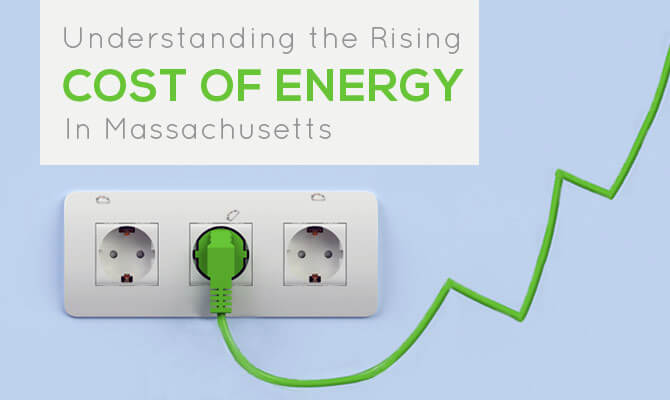
If you pay utility bills in Massachusetts, chances are that you have seen those bills increase over the years. According to the Boston Globe and federal data, Massachusetts electricity costs for households and businesses were well above the national average in 2014 at 39% higher and 79% higher, respectively. National Grid proposed another 20% hike in electricity rates, which will take effect in November 2015. Energy rates typically increase in the winter due to increased production costs in the winter.
How do utility companies make money?
Utility companies are deregulated under Massachusetts state law. Because of this, electricity companies go through a bidding process twice a year. Contracts are awarded to the lowest bidder. The costs are passed along to the consumer without being marked up. Utility companies profit by delivering power from the power plant to the customer.
The Rising Cost of Energy in Massachusetts
Massachusetts has historically had one of the highest average retail electricity rates in the country. Since 1990, utility rates for Massachusetts and New England residents have doubled with the biggest increases occurring since 2004.
According to the U.S. Department of Energy, Massachusetts residents paid on average of 10.9 cents per kilowatt-hour in 2004, while the national average was 7.6 cents per kilowatt-hour. Over the last few years, utility prices in Massachusetts have increased dramatically. These increases are due to a few factors including the cost of natural gas, which is set by supply and demand.
According to the Massachusetts Attorney General’s office, 40% of the power plants in the New England region are powered by natural gas. Whenever natural gas prices increase so do production costs, resulting in higher electric rates to consumers.
A few points to consider:
- Due to fluctuations in petroleum and natural gas prices over the years, the long-term forecast is for energy is high prices.
- Although natural gas is usually thought of as one of the cheapest ways to produce power, the rate of residential consumption of natural gas causes the price to be high.
- Between 2000 and 2013, the percentage of electricity on the New England grid that came from natural gas increased from 15% to 46%.
- During the winter, electricity rates increase because residential consumer heating takes priority when it comes to natural gas, leaving a reduced supply to generate electricity. In 2014, the demand for residential heat hit record levels thanks to record cold temperatures.
Can solar power make a difference in helping you reduce your electric bills?
Solar panels can make an enormous difference in reducing your electric bills! Since solar panels do not require fossil fuels or natural gas to produce power, homes that rely on solar energy do not have to pay for those costs. Once Wattson Home Solutions installs solar panels on your roof, the power they produce is virtually free to generate.
Wattson Home Solutions’ solar panels can help you:
- Save money
- Increase your home’s value
- Gain energy independence
- Become a lean mean energy producing machine.
Did you know?
Generating your own energy with solar can drop your utility bill significantly, but did you know it can also earn you money? When your solar system produces energy that your home doesn’t immediately use, your excess energy goes back to the grid. Most utility companies will pay or credit you for the energy you produce.








